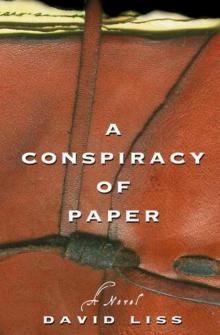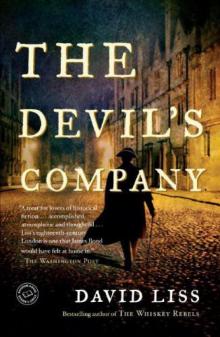- Home
- David Liss
The Devil's Company bw-3 Page 16
The Devil's Company bw-3 Read online
Page 16
A polite if somewhat grave servant met me at the door and guided me inside and to a receiving room, where I was met shortly by Mr. Ellershaw, resplendent in his full-bottom wig and dressed in the height of imported finery. His waistcoat had quite obviously, even to my ignorant eyes, been woven in India, and was magnificent in its red and blue and black floral designs of indescribable intricacy.
“Ah, this is a very important evening, Mr. Weaver. Of the utmost importance, you know. Mr. Samuel Thurmond is here tonight, a Member of Parliament for Cotswold. He has been one of the great champions of the wool interest, and it is our role to convince him to back our proposal in the House.”
“The repealing of the 1721 legislation?” I asked.
“Exactly.”
“And how shall we do that?”
“You need not worry on that score for the moment. You need only follow my lead, and all shall be well. Now, as you are the last guest to arrive, you must follow me to the sitting room. I trust you will do nothing to embarrass me before my guests?”
“I will attempt to acquit myself to your liking,” I assured him.
“Ah, good. Good.”
Mr. Ellershaw led me through a maze of closely wrought corridors and into an expansive parlor where a number of guests were sitting upon sofas and chairs, sipping at glasses of wine. The only person in the room I knew was Mr. Forester, who did remarkably well at paying me no mind.
I was quickly introduced to Mrs. Ellershaw, a beautiful woman at least twenty years younger than her husband, though no doubt at least in her middle thirties. “This is my new man, Weaver,” Ellershaw said. “He’s a Hebrew, you know.”
Mrs. Ellershaw had hair so pale it was nearly white, her skin was the color of porcelain, and her pale gray eyes were remarkably bright and lively. She took my hand and curtsied and told me she was delighted to meet me, but I could see that she was not. It took no great interpretive skills to see she was displeased by my presence.
Ellershaw appeared to have no recollection of having introduced me to Forester, and Forester showed no sign that he had previously met me. He too introduced his wife, but if Mr. Ellershaw held a winning ticket in the matrimonial lottery, Mr. Forester had drawn a blank. Though he was still a young man, and of a fine and manly appearance too, his wife was a great deal older than he was. Indeed, to call her elderly would not exaggerate matters. Her skin was leathery and hard, her muddy brown eyes sunken, her teeth yellowed and broken. And yet, unlike Mrs. Ellershaw, Mrs. Forester was of a jolly disposition. She told me she was glad to meet me and appeared to mean it.
I was then introduced to Mr. Thurmond and his good lady. The Member of Parliament himself was far older than Ellershaw, perhaps even a septuagenarian, and his movements were frail and uneasy. He walked heavily on his cane and shook slightly when he took my hand, but he appeared in no way lacking in his capacities. He made easy and intelligent conversation, and of all the men in the room it was he to whom I took the greatest liking. His wife, a handsome older woman dressed entirely in woolens, smiled kindly but said little.
Because the British dinner party cannot function without equity of the sexes, a fourth woman had to be presented to balance out my presence. To this end, Mr. Ellershaw had invited his sister, another older woman, who made it clear that she had been forced to abandon tickets to the opera in order to dine with us and was not at all happy about it.
I shan’t bombard my reader with the tedium of the dinner itself. It was hard enough for me to endure, and I therefore have no desire either to relive the event or force my reader into a sympathetic misery. Much of the talk, as is the usual for talk at these sorts of events, revolved around the theater or the popular amusements about town. I thought to participate in these exchanges, but I observed that every time I opened my mouth, Mrs. Ellershaw eyed me with such evident disgust that I found it more agreeable to remain mute.
“You may eat freely,” Ellershaw told me loudly, after he had helped himself to innumerable glasses of wine. “I have asked Cook not to present any pork. Weaver’s a Jew, you know,” he told the rest of the group.
“I daresay we do know,” answered Mr. Thurmond of the wool interest, “as you have noted that point several times. And while our Hebrew friends are certainly in the minority on this island, I hardly think them so rare that they must be remarked on in such a way.”
“Oh, but it is a remarkable thing for us. My wife does not think it proper to have Jews at the dinner table. Is that not right, my dear?”
I attempted to say something distracting, something that would change the subject away from this awkward business. Mr. Thurmond, however, decided that it was he who would rescue me. “Tell me,” he said, too loudly, so that his voice would crush the discomfort of Ellershaw’s comments, “Where is that charming daughter of yours, Mr. Ellershaw?”
Mrs. Ellershaw took on a high color, and Mr. Ellershaw coughed awkwardly into his fist. “Well, yes. As for that, she isn’t my daughter. Bridget came with my marriage to Mrs. Ellershaw. A rather fair bargain, I think. But the girl’s not about these days.”
There was clearly more information regarding the daughter, and none was forthcoming. Thurmond could not have appeared more mortified to have stumbled upon so delicate a topic. He had attempted to distract from an awkward moment but had only succeeded in making the moment worse. His wife, fortunately, launched into an encomium of the pheasant on our plates, and in the end that did the business well enough.
After the meal had been completed and the ladies retired to the next room, the true business of the evening was at hand. Now that we were men only, the conversation turned at once to the East India trade and the legislation against it.
“I must ask of you, Mr. Thurmond,” Ellershaw began, “that when Mr. Summers, a true patriot, introduces an act to repeal the 1721 legislation, as I believe he will do in the near future, you might consider lending your support to the effort.”
Thurmond let out a laugh. His old eyes sparkled. “Why, that piece of legislation was an enormous victory. Why should I ever countenance its repeal?”
“Because it is the right thing to do, sir.”
“Freedom of trade,” chimed in Mr. Forester.
“That’s just it,” Ellershaw said. “Freedom of trade is the thing. Perhaps you have read the numerous works penned by Mr. Davenant and Mr. Child on the theory of free trade and how it benefits all nations.”
“Both Davenant and Child were directly interested in the East India trade,” Thurmond pointed out, “and can hardly be considered impartial advocates.”
“Oh, come. Let’s not be petty. You shall see for yourself if this wretched legislation is allowed to stand. The trade in calicoes here may cost some small number their employment, but its absence will diminish the available livelihoods as well. I believe that the East India trade offers far more opportunity than it takes away. What of the dyers and patternmakers and tailors who will be out of work?”
“That is not the case, sir. These people will earn their living through dyeing and making patterns for and constructing suits made of silks and cottons and the like.”
“It is hardly the same thing,” Ellershaw said. “There can never be the same enthusiasm for those clothes. It is not necessity that drives the market, sir, but fashion. It has ever been our way at the Company to introduce new fashions every season. We bring in new patterns or cuts or colors, and we put them upon the backs of the fashionable, and we watch while the rest of the nation lines up to get the newest thing. Our stock, not the desire of the people, must drive commerce.”
“I assure you, fashions can and do exist in materials other than imported Indian textiles,” Thurmond said, with great satisfaction, “and I believe the very notion of fashion will survive your ability to manipulate it. Allow me to show you something I brought along, suspecting as I did that the conversation might take such a turn as this.” He reached into his pocket and pulled out a square of cloth about a foot in diameter. It was of a bluish base with yellow and
red floral patterns upon it—remarkably handsome.
Forester took it from the old gentleman and looked it over, holding it in his hand. “An Indian calico. What of it?”
“It is no such thing!” Ellershaw barked. He snatched it out of Forester’s hands and held it for less than two seconds before his face twisted into a grimace. “Ha, you clever dog! Indian calico, you say, Mr. Forester? This is spun of American cotton, I’ll wager, by the coarseness of it, and printed here in London. I know every Indian print there ever was, and this is a London pattern if I’ve ever seen one. Mr. Forester is new to the India trade, for only an innocent could make such a silly mistake. Indian calico, indeed! What is your point, sir?” He returned the fabric to Thurmond.
The older gentleman appeared at least partially gratified. “Mr. Forester’s mistake is an understandable one, for the cloth is very like an Indian one.”
“That cotton is crude enough to rub the crust off a chimney sweep,” Ellershaw called out. “Forester is an ignorant pup, I say. He knows nothing of textiles, just business. No harm meant, Forester. I have the greatest respect, and so on and so forth, but even the most remarkable intellect may be a dunce when it comes to textiles.”
Forester had by now turned bright red with mortification, but he said nothing.
“As Mr. Forester has observed,” Thurmond said, “American cotton can be spun with increasing skill to resemble Indian imports. This example may not deceive an aficionado such as yourself, but it may well fool the average lady in search of a gown. Even if it should not, new inventions are made all the time, and soon enough it will be impossible to tell the Indian from the American. Our native linens are being made with lighter threads, more like Indian fabrics, and wool and linen can be combined with great skill. Mr. Forester’s mistake is an easy one to understand. The days of Indian imports are near over anyhow.”
“I defy your argument. Mr. Forester may not be able to tell American cotton from his own shite, but there’s not a lady of fashion or a clothes-loving beau on the island that would have been so fooled.”
“As I say, perhaps not yet but soon.”
“And what is to motivate these inventions?” Ellershaw demanded. “If people cannot have their India cloth, then the textile workers have no reason to improve their goods, for they own the market. It is the competition, you know, that will drive them.”
“But they can’t compete with these Indian workers, men and women who live as slaves, earning pennies per day at most. Even if we could produce textiles here in every way indistinguishable from the Indian, they would cost far more because we must pay our laborers more.”
“The laborers must learn to do with less,” Forester suggested.
“Fie, Mr. Forester, fie. Men must eat and sleep and dress themselves. We cannot ask them to make do with less because the Moguls of the Indies can demand that of their people. It is for that reason that we need the legislation. Is it not the government’s role to step in and solve such problems?”
“It ought not to be,” Ellershaw said. “I have spent my life in the trade, and if there is anything I have learned it is that government is not the solution to our problems. Rather, sir, government is the problem. A freely trading society in which the man of business is not taxed or burdened or hindered is the only truly free society imaginable.”
“What freedom is this?” Thurmond demanded. “Sir, I know of your freedoms. I know that the East India Company controls more than one workhouse, and you conspire to have silk weavers arrested and put to work there, spinning without wages. And you, through your influence, have encouraged the growth of silk laborer colonies outside the metropolis, where wages are lower.”
“What of it?” Ellershaw demanded.
“Do you think the world blind to your schemes? Why, I have even heard that there are agents of the Company among the silk workers. The men poor laborers often trust to look out for their advantage look out instead for the advantage of their oppressors. You contrive to lower the wages of silk workers so that silk working is no longer viable. You plan for the future, I see, to make silk so hard to come by at home that people will clamor once more for Indian imports.”
I thought of Devout Hale’s man, taken by the constable and thrown in the workhouse. Now it appeared he had been caught in a trap set by the East India Company with the goal of crushing the competition. And what chance did Hale and his men have? They were but people who had to live and eat and support their families. The Company had stood for a hundred years and would surely be standing a hundred years hence. It seemed to me that mortals did battle with gods.
Thurmond—who had, perhaps, made too free with his wine-continued to berate Ellershaw. “You do what you like, you harm whom you like, and yet you call yourselves the Honorable Company? Better to call yourselves the Devil’s Company, if you are to put a true face on it. You imprison and break spirits and seek to contain all trade for yourself, and yet you speak of freedom. What freedom is this?”
“The only freedom imaginable, sir. A republic of commerce that spans the globe, in which we may buy and sell without regard to tariffs or duties. That is the natural evolution of things, and I shall fight to bring it about.”
Thurmond gurgled doubtfully into his goblet. “A world controlled by those who care only for acquisition and profit must be a world of terrors indeed. Companies concern themselves only with how much money they can make. Governments at least look after the well-being of all—the poor, the unfortunate, and even the laborers, whose work must be cultivated, not exploited.”
“You are a mighty fine man to speak of the laborers,” Forester chimed in. “You own, sir, a vast estate in which the raising of sheep is your principal source of revenue. Is it not for your own benefit, your own investment in the wool trade, rather than the good of the laborers, that you seek to curtail the business of importation?”
“It is true that I earn my income from wool, but I do not see why I should be condemned for doing so. My lands bring in wealth, yes, but they also bring employment and substance to those who live on my lands, those who work the wool we produce, those who sell the products. There is a great chain of benefit that rises from natively produced goods. Imports, while they may benefit the few and indulge the tastes of the fashionable, do not contribute to the greater good.”
“The wealth of the nation is the greater good, sir, the only greater good. And when the merchants and industrious men of the nation are wealthy, then those blessings will disseminate to all who live in the land. That is but truth, sir, and a simple one at that.”
“I fear we will go round and round for an age and yet never convince our friend. Far better we understand that he has his position as we have ours,” Forester proposed, “and we must live with one another accordingly.”
“Yes, yes, very diplomatic, Mr. Forester, but diplomacy will get us nowhere, and it is, in my opinion, a sign of weakness. Still, I know your efforts are well intended. Spirit of friendship and all that.”
“Indeed, and now if you gentlemen will excuse me, I am afraid I must depart rather early tonight.” Forester rose from his chair.
“Somewhere more important to be, sir?” Ellershaw demanded, his voice not as unkind as his words. Still, there was no mistaking that he spoke with all the malice of a crouching predator.
“No, no, nothing of the kind. My wife mentioned to me that she was feeling unwell earlier, and I perceived she wished to depart early.”
“Feeling unwell? Are you speaking against the food I’ve served?”
“Not at all. We have been delighted by your hospitality, but she has suffered from a bit of a chest cold of late, and I believe it may be returning.”
“Hardly surprising, woman of her age. Marry younger, not older. That would have been my advice to you, Forester; had you asked, it could have done you some good. Yes, yes, I know your father made you marry that crone for her money, but you might have made a greater impression upon him had you refused to listen to his foul advice.”
Seeing that Forester was too stunned to speak, Thurmond volunteered himself to throw some water on the fire of Ellershaw’s discourse. “I see not what difference age makes to that happy estate, so long as it is a compatible match.”
Forester said nothing, but the expression on his face evidenced that the match was by no means compatible.
Ellershaw chose to ignore this intervention. “Sit, Forester. There is still much to discuss.”
“I should prefer not to,” he said.
“And I tell you to sit.” He turned to Thurmond. “The boy thinks to take my place at Craven House, you know. He must learn when it becomes a man to stay and when it becomes him to leave.”
Thurmond could not much like the growing thickness of the air. He rose himself. “I believe I shall take leave as well.”
“What is this, a mutiny? All hands on deck!” his host cried.
“It is late, and I am an old man,” Thurmond said. “We shall leave you to your quiet.”
“I require no quiet. Both of you sit that I may further entertain you.”
“You are too kind. Nevertheless,” Thurmond answered with a forced smile, most certainly having enjoyed more than his fill of Ellershaw’s company, “I have had a long day, I’m afraid.”
“Perhaps I have been unclear,” Ellershaw said. “I must insist you not leave. We have not yet concluded our business.”
Thurmond, who now stood by his chair, turned to study his host. “I beg your pardon?”
“You may not leave. Do you think I invite a pugilist Jew to dine with us because of his charming conversation and great learning? Don’t be a blockhead. Weaver, be so good as to see that Mr. Thurmond returns to his chair.”
“I must protest, Mr. Ellershaw,” Forester said, “but I cannot think this is right.”

 The Whiskey Rebels
The Whiskey Rebels Renegades
Renegades The Twelfth Enchantment: A Novel
The Twelfth Enchantment: A Novel The Day of Atonement
The Day of Atonement The Devil's Company
The Devil's Company Randoms
Randoms Paleo / The Doomsday Prepper
Paleo / The Doomsday Prepper Rebels
Rebels A Spectacle of Corruption
A Spectacle of Corruption The Twelfth Enchantment
The Twelfth Enchantment The Coffee Trader
The Coffee Trader The Ethical Assassin
The Ethical Assassin The Devil’s Company: A Novel
The Devil’s Company: A Novel The Double Dealer
The Double Dealer The Whiskey Rebel
The Whiskey Rebel A Conspiracy of Paper bw-1
A Conspiracy of Paper bw-1 The Devil's Company bw-3
The Devil's Company bw-3 Marvel's SPIDER-MAN
Marvel's SPIDER-MAN